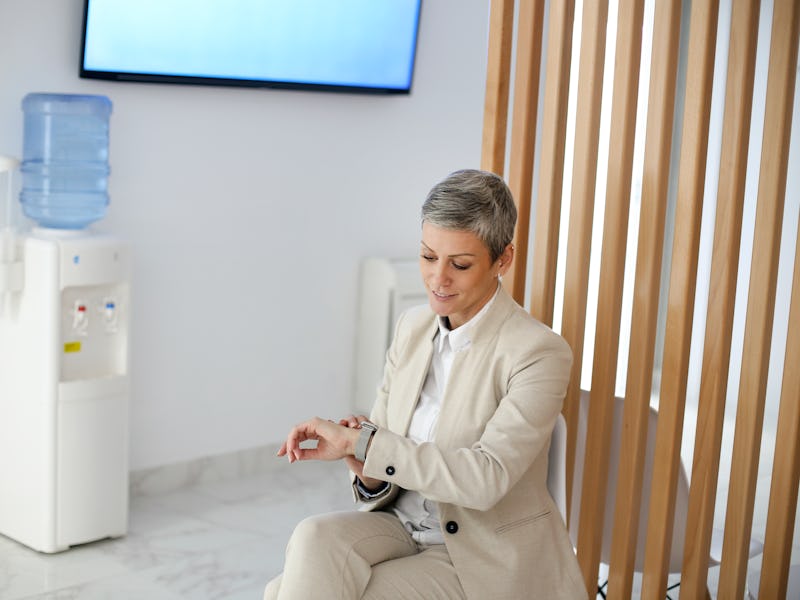Microbreaks may be a ‘panacea’ for workday wellness
Anywhere between 8 seconds and 10 minutes does you some good.

You’ve heard of lunch breaks and coffee breaks, but now get ready for microbreaks. Defined as work reprieves lasting less than 10 minutes, microbreaks can materialize as staring out the window, playing with a desk tchotchke, having a chat with a co-worker or friend, or reading something — and they could be key to balancing your mental health and workday productivity.
Evidence shows microbreaks are as integral to productivity as are discipline and persistence — and a 30-minute lunch break alone won’t cut it. Researchers in Romania published a meta-analysis this week in the journal PLoS One of more than 20 studies attesting to the microbreak’s magic of catering to our human needs while keeping work performance at a high.
LONGEVITY HACKS is a regular series from Inverse on the science-backed strategies to live better, healthier, and longer without medicine. Get more in our Hacks index.
Science in action — The team rounded up and scoured 22 productivity studies published in the last 30 years that included a total of 2,335 participants. They analyzed the type of work performed, what setting it was in, and how taking a break impacted performance outcomes. The studies varied. Some looked at students rather than employees, and others compared break lengths to the impact of taking a break at all.
They sought data to support the statement that microbreaks both increase one’s vigor and decrease one’s fatigue levels, and then how effectively these moments of rest improve performance.
Some types of microbreaks included relational activities, like checking in with friends or family, social media and games, and watching a video. The researchers also measured a microbreak’s impact based on the type of task at hand: creative, cognitive, or clerical. Of the three, microbreaks had the largest effect on clerical tasks and a small but still significant effect on creative tasks.
Why it’s a hack — Think of yourself as a car, writes Patricia Albulescu, lead author and psychologist at the West University of Timişoara in Romania, to Inverse. “When we exhaust all of our fuel, it all stops, and then is harder to start again without extra effort.”
Breaking off from work, even for a little, refreshes motivational and cognitive mechanisms, the paper states, and replenishes strained resources.
A recent study published in Cell Biology broke into the why behind a break’s importance in mentally taxing work, outlining the science behind why thinking tuckers us out. In brief, glutamate, a protein building block called an amino acid, acts as an excitatory neurotransmitter, through which the brain messages nerve cells. Glutamate production stimulates nerves, and researchers have seen glutamate build up outside brain cells during trying tasks.
While this meta-analysis didn’t analyze the biological mechanisms behind why our brains conk out from work, this past study informs some of the metabolic processes behind that moment when we’re begging to pee just to get away from the computer.
The researchers didn’t try to identify the ideal frequency or time of microbreaks. Rather, they looked at how any break at all had an impact on performance. However, they did find that the longer the break — that is, the closer to 10 minutes in duration — the greater the boost in performance.
That said, how many daily microbreaks hits the sweet spot?
“As many as needed, when needed,” Albulescu says. “When we power through daily tasks and ignore our needs, we make mistakes, we take more and more time to complete a task as we tire, we have to gather (if any) other resources, and with more effort to finish a task, and so on. It is not pleasant nor productive.”
These data could also offer guidelines on how to take breaks. For example, some people don’t like the Pomodoro method, in which one works for 25 minutes, breaks for 5 minutes, and repeats for a few cycles, precisely because it interrupts their workflow. On the other hand, others need it because it’s a mandated break after what many find to be a reasonable amount of work time. If someone knows that cognitively demanding tasks, for them, don’t benefit from microbreaks, then they shouldn’t feel compelled to tear away from what they’re doing. On the other hand, those cleaning spreadsheets and alphabetizing files through clerical work could take microbreaks as often as they want.
Another good way to measure whether a microbreak works for you is to check how your work changes after one. “When taking a short break when we feel the need to, we can notice that new ideas start to flow easily again,” Albulescu writes.
How it affects longevity — In a pandemic that brought to light the scourge of burnout, we better understand the long-term consequences of going without rest. (Though practices haven’t necessarily changed.) Burnout isn’t just about getting enough breaks in the workday, of course, but a buildup of unrelieved stress and unrelenting pressure.
Not every job has room for a break, which is where microbreaks may be an advantage. Though they must be taken strategically and deliberately, even breaking for a few seconds to take a breath can replenish resources somewhat. Microbreaks can also be taken covertly at one’s desk, so in a culture that discourages taking a breather, one can have a moment without being too conspicuous. Still, Albulescu emphasizes that a microbreak closer to 10 minutes is more effective.
“We can feel guilty or pressured to continue working and not take a well-deserved break,” Albulescu writes. “With this study, we hope to wash away some of the bad reputation breaks have, and empower a bit the employees to take breaks as needed and not continue to power through the next email, the next call, the next customer, and so on.”
Hack score out of 10 — ☕🚶♀📱😴☕🚶♀📱 (7/10 sub-10-minute breaks to have some coffee or tea, play a game, call a friend, talk a walk, or power nap)